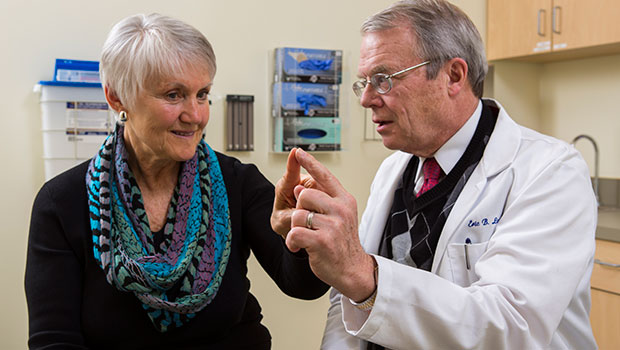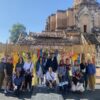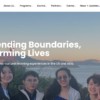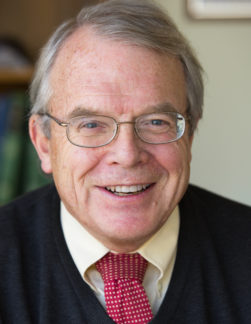 Dr. Eric Larson joined VIA’s volunteer program in Hong Kong in 1968. This international service experience was the beginning of a rich career in medicine and medical research. This year, Dr. Larson released his book, Enlightened Aging: Building Resilience for a Long, Active Life. We contacted Dr. Larson to catch up, learn more about his journey from Hong Kong to Harvard and the medical profession, and how his experiences have influenced his work.
Dr. Eric Larson joined VIA’s volunteer program in Hong Kong in 1968. This international service experience was the beginning of a rich career in medicine and medical research. This year, Dr. Larson released his book, Enlightened Aging: Building Resilience for a Long, Active Life. We contacted Dr. Larson to catch up, learn more about his journey from Hong Kong to Harvard and the medical profession, and how his experiences have influenced his work.
VIA Volunteer Experience
How did you first become involved with VIA?
I met Dwight Clark (VIA’s founder) as a freshman in 1965 and then got to know several VIA and IVS volunteers who were sponsors in Wilbur Hall. I first planned to go to Vietnam as an IVS volunteer and studied Vietnamese language but the Tet Offensive made it too dangerous to send those volunteers, so I went to Hong Kong instead.
What inspired or convinced you to apply to be a volunteer?
Interest in Asia and desire to be of service, make positive changes.
Could you describe a little of your experience as a volunteer?
I taught in a rooftop school which served children who lived in a resettlement block building. I also taught medical English to a highly diverse group of physicians (including one traditional healer). Many of the physicians had left mainland China during the cultural revolution.
How did this experience change your perspective, as well as your personal and professional goals?
It gave me a keen interest in Asia as a region and in Asian cultures. I also saw the powerful effect that a single individual could have on other individuals through service. I think it mostly confirmed my interest in service to others, the importance of how we effect others in close contacts and my desire to combine service and science in pursuing a medical (and eventually research) career.
What has been your journey since completing your volunteer experience?
I went on to Harvard Medical, completed training and pursued an academic career of teaching, research, patient care and leadership service. One highlight that was definitely an outcome of VIA is that I led a cross-cultural study of aging and dementia in Japanese-Americans in Seattle affiliated with a study of Japanese-Americans in Hawaii and in the Hiroshima radiation effects registry and its studies of those surviving the bomb. We also had collaborations with Taiwanese scientists in parallel who studied aging in small, rural islands off the coast of mainland China where median education level was one year. This work has decreased in the sense of no additional funding but we are still using the data we’ve collected and I’ve developed a wonderful relationship with our Japanese American Community advisory board members in Seattle.
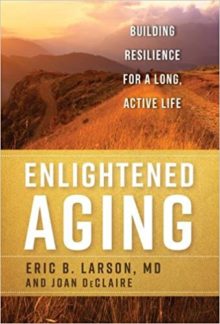 Enlightened Aging
Enlightened Aging
You recently published a book, “Enlightened Aging”, where you provide advice for growing old with resilience and foresight. What was the impetus or inspiration for this work?
I had long wanted to write something for a lay audience about our work and advances in what we know about aging. I never had time but I was able to carve out a sabbatical in Cambridge University. I thought that because of my 40 or so years of primary care practice and our research findings and advances in aging science, I wanted to write a book that offered people the knowledge and skills that would allow them to develop a realistic and proactive approach to how they approach aging. There are a lot of misconceptions, ranging from “doom and gloom” about changes of aging to magical thinking there is (somewhere) a magic bullet, or that aging is somehow something to avoid or deny happens. I’ve seen a lot of people approach aging in ways that are successful and lead to a very happy long life – not with aging being suffering and a punishment for living a long time. I also felt that many of the baby boomer generation (mine) had now seen large numbers of people in their 90s and we expect to live a long time. This contrasts with our parents generation where not so many people lived to that old age – so this generation and beyond that is now entering older age can learn and approach old age “enlightened” and with a proactive, activist attitude.
The emphasis on resilience and community really stands out in the book, because they are something VIA often focuses on cultivating through its programs. In your opinion, why is resilience important for us as individuals and as a community?
We need to expect that as individuals and communities we will face hardships both as we age and as communities – these can be gradual and expected, or unexpected. By building resilience, and in terms of aging, the three reserves (physical, cognitive and social/spiritual) we can bend, not break, and also reduce risk and rates of decline and indeed, actually improve many aspects that affect our health and well being.
Could you give us a bit of a preview of how you advise people to develop resilience with regards to aging?
The key is to build these reserves throughout life – it starts even at or before birth so community health is important – but for individuals, Physical means exercise including fitness, strength and balance, avoiding falls and too much care and too many medicines. Mental includes staying active mentally, attending to mood and addressing depression, and Social is through staying engaged in relationships that are important and meaningful, contributing to our communities and addressing the inevitable shrinking of social networks if you live a really long time.
You mentioned that the book is most applicable to the baby boomer generation, which is now represents the majority of the senior population. How do you see social attitudes and norms shifting around aging with different generations?
I do hope my book will contribute to an activist and at the same time realistic, “enlightened” approach to aging. I also think that we’ll see some major changes in how people seek and consume care in late late life including around the time when people approach death or even just advanced old age with frailty. I believe we’ll see a compression of morbidity as people live longer in better health and have a shorter time when they are dependent on things like nursing home care – that’s a goal that is achievable and is happening in some places already.
You also conducted aging studies with populations in Japan, Hawaii, Seattle, and Taiwan. Could you describe one or two significant or surprising outcomes of these studies?
The most striking thing is that we found such common attitudes towards what people considered successful aging – it was not longevity but rather avoiding dependency or having only a short period of dependency, maintaining meaningful relationships, not being a burden to others, and staying healthy as long as possible – not living as long as possible.
Looking Forward
What’s next? Do you have any other projects or books in the works?
I have a study which I began in 1986 which has continued to be funded and I hope will go forward. I have been fortunate enough to work with an organization where research subjects are generous and want to contribute and over time we’ve developed amazing relationships with other scientists. I will likely continue this work for as long as I feel I’m making a contribution. We’ve also just had a very exciting grant awarded to test a way to prevent dementia and/or slow the rate of cognitive decline – this draws on all our research and that of others around the world.
Kaiser Permanente has just purchased my parent organization, Group Health Cooperation, and I’ve been named VP of research and innovation in addition to leading our research institute – I want to see that acquisition through to a successful launch with regard to establishing ourselves as a premier Learning Health Organization where practice and community needs influence research and vice versa.
We’re in the process of selecting the next cohort of the Global Community Fellowship (formerly the volunteer program). What advice would you offer to someone who is considering or about to start their volunteer (now fellowship) experience?
Go for it!!
Thank you, Dr. Larson. We look forward to the results of your continued research!
To our readers: Dr. Larson said that he would be happy to have further discussions with anyone interested in his field. If you would like to get in touch with him, please get in touch with us. We’d be happy to connect you!

